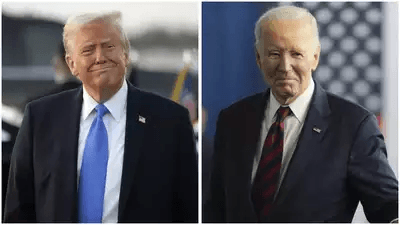Introduction
In what is being called one of the most significant acts of political retaliation in modern U.S. history, former President Donald Trump has revoked Joe Biden’s access to classified intelligence briefings. This dramatic move comes amidst escalating tensions between the two political rivals, setting the stage for an even more polarized election season.
While many of Trump’s supporters hail this decision as a bold assertion of power, critics argue that it’s nothing more than a petty act of political revenge that could undermine national security. The question remains: Is this a masterstroke of strategy, or a risky miscalculation that could backfire?
Background: The Longstanding Trump-Biden Rivalry
The political animosity between Trump and Biden has been one of the defining aspects of American politics over the last decade. Biden’s victory over Trump in the 2020 Presidential Election was followed by a series of legal battles, policy reversals, and personal jabs, creating a deeply divided electorate.
In 2021, President Biden revoked Trump’s access to classified intelligence briefings, citing concerns over his “erratic behavior” and potential security risks. That decision was widely debated, with many arguing it was a necessary move to prevent Trump from mishandling sensitive information. Now, with Trump making a political comeback, he has seized the opportunity to return the favor—but in a much more public and dramatic fashion.
What Did Trump Do? The Big Power Move
On February 7, 2025, Trump announced that Biden would no longer have access to classified intelligence briefings, mirroring Biden’s earlier decision. However, Trump took it a step further, choosing to publicly announce the revocation with his signature phrase: “Joe, you’re fired.”
This announcement was made during a high-profile rally, where Trump described Biden as “incompetent” and “unfit” to handle national security matters. He cited a recent Department of Justice report that raised concerns about Biden’s memory and cognitive abilities, suggesting that the former president could no longer be trusted with sensitive intelligence.
Reactions: Cheers, Outrage, and National Security Concerns
Trump’s decision has shaken the political landscape, eliciting strong reactions from both supporters and critics.
Supporters Applaud the Move
Trump’s base has celebrated the decision as a justified act of political vengeance, framing it as a long-overdue response to Biden’s “hypocrisy”.
Republican Senator Tom Cotton said, “Biden started this fight by revoking Trump’s access in 2021. Now, he’s just getting a taste of his own medicine.”
Many conservatives believe that Biden’s declining cognitive health justifies the move, arguing that someone who struggles to recall key events should not have access to high-level intelligence briefings.
Democrats Condemn Trump’s Retaliation
However, Democrats have slammed the decision, calling it reckless, vindictive, and harmful to national security.
Former White House Press Secretary Jen Psaki labeled the move as “nothing more than Trump’s obsession with humiliating his opponents.” She further warned that this sets a dangerous precedent, where intelligence access could be used as a political weapon rather than a security necessity.
Could This Move Backfire on Trump?
While Trump’s supporters see this as a major power play, there are growing concerns that it could undermine his credibility among moderates and security experts.
1. National Security Implications
Intelligence briefings are provided to former presidents to ensure they remain informed in case they are needed to advise on foreign policy or national security matters. Experts argue that revoking Biden’s access could create gaps in intelligence continuity, making America less prepared for global crises.
2. Political Fallout
This move could alienate undecided voters, particularly independents who are looking for a leader focused on governance rather than personal vendettas.
3. Potential Legal Challenges
While presidents have broad authority over intelligence access, this decision could be challenged in court if it is perceived as an abuse of power.
What’s Next? The Road to 2024 and Beyond
With the 2024 election looming, this development is expected to intensify the already-heated political landscape. Both Trump and Biden will likely use this incident to fuel their campaigns, with Trump portraying himself as a leader who takes decisive action, while Biden’s team may frame it as evidence of Trump’s authoritarian tendencies.
This also raises the question: If Biden wins re-election, will he reinstate his intelligence access and revoke Trump’s once again? The cycle of political retaliation seems far from over.
Conclusion: A Turning Point in U.S. Politics?
Trump’s decision to revoke Biden’s intelligence access marks a significant escalation in their political battle. While it may energize his base, it also comes with potential legal, political, and national security risks.
The ultimate question remains: Will this move solidify Trump’s dominance, or will it backfire and hurt his chances of reclaiming the presidency? Only time will tell, but one thing is certain—this is just the beginning of an even more contentious election season.
Also Read-
1. Tragedy in Sao Paulo: 2 Lives Lost, but Could More Powerful Safety Measures Have Prevented This?
2. 10 Lives in Peril: Is the Bering Air Tragedy a Warning for Aviation Safety?
3. 6 Countries Ban DeepSeek AI: A Necessary Security Move or Unfair Targeting?




















One thought on “Trump’s 1 Biggest Revenge Move Yet: A Power Play or a Political Mistake?”